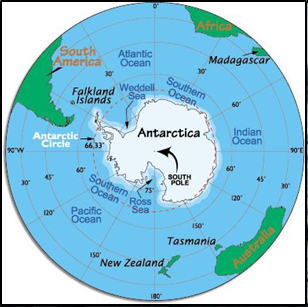ANTARCTICA’S DEEP-WINTER HEATWAVE: CAUSES AND CONSEQUENCES
Why in the news?
- Antarctica is experiencing an unprecedented deep-winter heatwave due to a weakened polar vortex and reduced sea ice.
- This could accelerate ice sheet loss and impact global weather patterns.
source:britanica
About Current Heatwave in Antarctica:
- Record Temperatures: Antarctica is experiencing a deep-winter heatwave, with temperatures 10°C above average and up to 28°C higher on some days.
- Temperature Ranges: In East Antarctica, temperatures are between -25°C and -30°C, compared to the usual -50°C to -60°C.
Causes of the Heatwave:
- Weakened Polar Vortex: The disruption of the polar vortex has allowed warmer air to enter Antarctica. This disturbance, caused by large-scale atmospheric waves, is rare and expected only once every two decades.
- Reduced Sea Ice: The decrease in Antarctic sea ice, which was at a record low in June, contributes to higher temperatures. Less ice means less sunlight is reflected back to space and more heat is absorbed.
Potential Impacts:
- Ice Sheet Loss: The heatwave could accelerate the loss of the Antarctic Ice Sheet, which contributes to rising global sea levels. Recent heat waves have already caused significant ice loss, including a major ice sheet collapse in 2022.
- Global Effects: Melting ice impacts global ocean circulation, reducing salinity and density, which disrupts heat and carbon transport. This can intensify global warming and increase extreme weather events.
Key Facts about Antarctica:
About Marine Heat Waves (MHWs):
|




